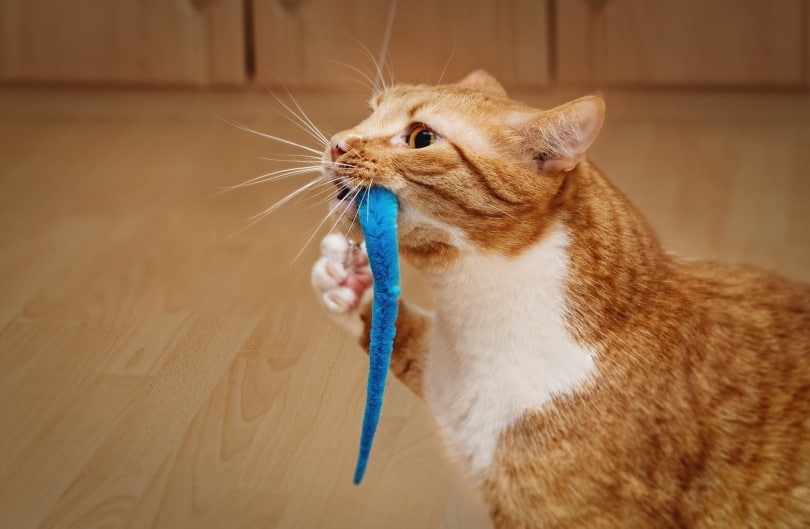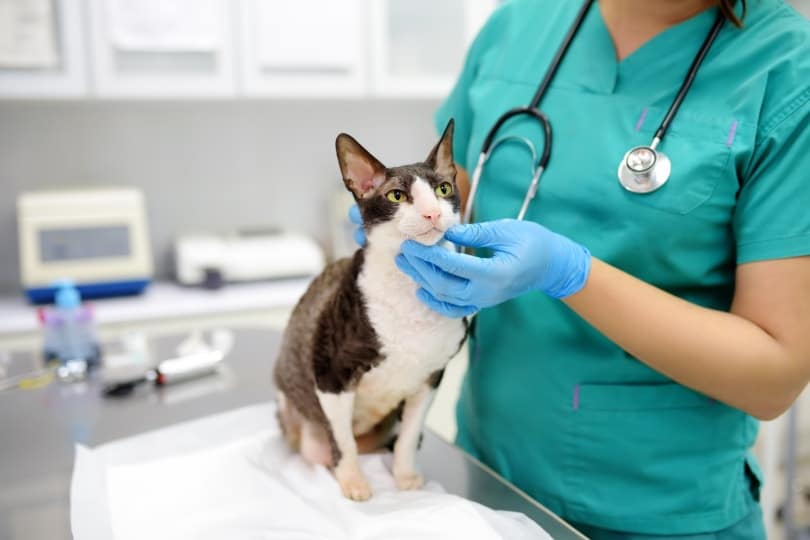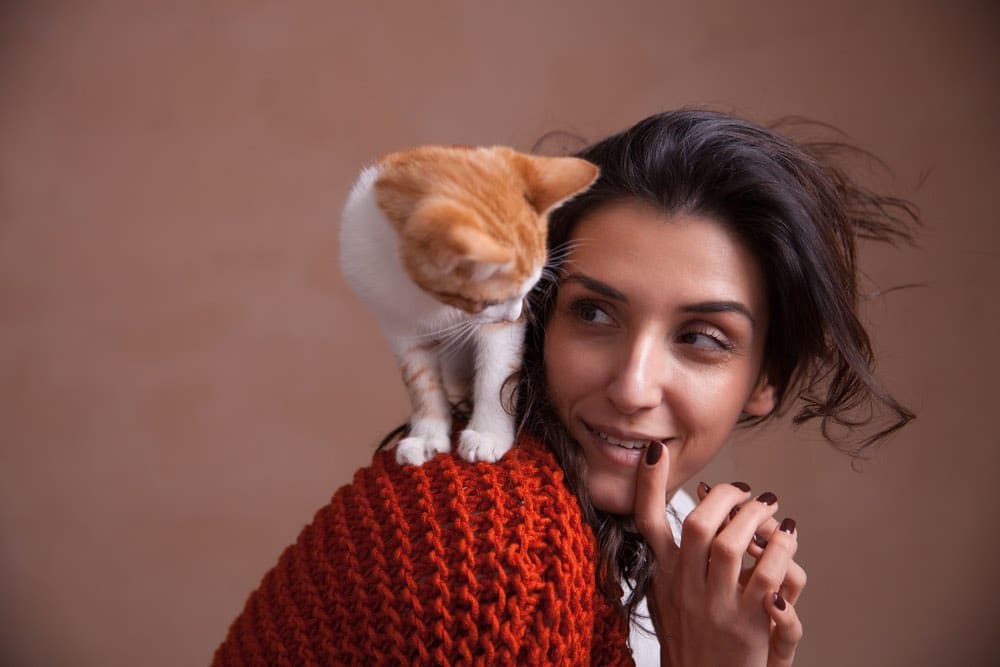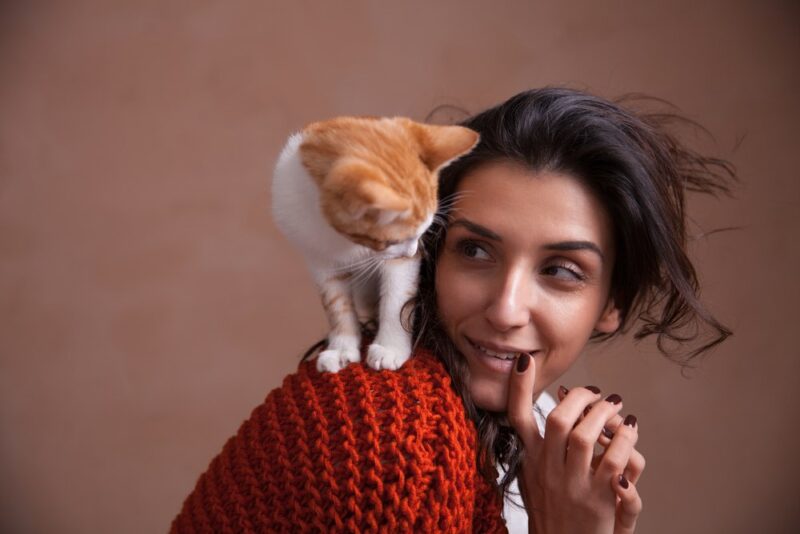Have you ever been cuddling or cradling your cat when she starts chomping on your hair? While this behavior may not be that bothersome, it could raise some questions. Is it normal for felines to chew on hair? What are the reasons behind this odd behavior?
Kitties are complex creatures and display many mind-boggling behaviors. To help you better understand your cat’s craving for hair, we’ve compiled an extensive list of reasons for this behavior, including some ways to discourage it.
The 5 Reasons Why Does Your Cat Chew on Your Hair
1. To Reduce Stress
Anxious cats may chew or bite your hair to alleviate their stress. Indulging in this habit enables your pet to reassert her claim on you while also deepening the strong bond you two share. If you notice your feline friend munching on your hair, she may be trying to self-soothe.
Moreover, cats that were weaned too early may exhibit oral fixations with hair. Suckling on your strands is the feline equivalent of a human toddler sucking on his thumb.
2. Compulsive Chewing
A cat that is a compulsive chewer may like to nibble on your hair. Cats that compulsively chew will literally chew on anything near them. Compulsive chewing can be caused by boredom or stress or can be a sign of OCD.

3. Grooming
In the wild, cats that are part of a community will spend large amounts of time grooming each other. Grooming behaviors include snuggling, biting, and licking. If you’re spending some quality time on the couch with your feline friends, they may start chewing your hair in an effort to “groom” you. It is their instinctual way of saying they love you.
4. Hyperthyroidism
Cats that are suffering from hyperthyroidism may start eating or chewing your hair. Hyperthyroidism is a condition where your pet’s thyroid gland is overactive and can cause your cat to become a voracious eater. If your cat is 10 years or older, has suddenly lost weight, and is experiencing an increase in appetite, schedule an appointment with your vet right away.

5. Pica
Pica is a medical condition that causes pets to consume items that aren’t edible. If you notice your cat snacking on your hair, the carpet, or dirt, she may have pica.
Tips for Stopping the Hair-Chewing Behavior
Hair chewing can be annoying for you and dangerous for your pet. Here are some steps you can take to discourage the bad behavior:
- Determine the Cause: Is your kitty showing you affection, or is their hair chewing a sign of an underlying medical condition? Schedule a vet appointment to find the root of her behavior.
- Reduce Stress: Stressful cats are more prone to chew on hair. Reduce your cat’s anxiety by stocking up on cat-calming pheromones, sticking to the same daily routine, and spending quality time with your pet.
- Move Away: If the behavior isn’t medically related, discourage your cat from chewing your hair by immediately distancing yourself from her once she starts to chew. For this strategy to be successful, you must act swiftly and consistently. After a few weeks, your cat will get the picture.
- Distract Her: To get your pet to leave your hair alone, give her something else to chew on. Offer her treats, toys, or cat grass. However, avoid constantly giving your cat treats as it may lead to weight gain.
- Switch Hair Products: Try using a certain-scented shampoo or hairspray to dissuade your cat from chewing your hair. Felines turn up their noses at citrus-scented products, so opt for hair products that smell like lemon.
Our Favorite Catnip Toy Great cat toys are crucial to keeping your cat happy and healthy. We love Hepper's Catnip Stick Toy because it's handmade in the USA, available in a cool range of colors, and sturdy enough to withstand your cat's sharp claws. Best of all, you won't find any filler here – just 100% organic catnip!
At Catster, we’ve admired Hepper for many years and decided to take a controlling ownership interest so that we could benefit from the outstanding designs of this cool cat company!
The Bottom Line
If your cat is constantly chewing on your hair, they might be exhibiting a sign of an underlying health condition. Take her to the vet to rule out any potential health issues. If your feline is simply displaying signs of affection, you can discourage her behavior by distracting her or distancing yourself.
Figuring out the cause of your kitty’s weird behavior can help you detect potential health concerns and put an end to the hair chewing once and for all.
Check out some of our other interesting cat behavior posts:
- Can Cats Burp? The Surprising Answer!
- Why Does My Cat Lick the Wall? 5 Reasons for This Behavior
- Why Does My Cat Eat My Hair? 9 Reasons for This Behavior
Featured Image Credit: lenina11only, Shutterstock













